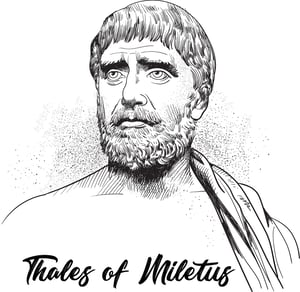 Welcome back to our series of blog posts on the history and philosophy of the economy, bankruptcy, and debt – today let’s return to the not-often discussed intersection of philosophy and finance.
Welcome back to our series of blog posts on the history and philosophy of the economy, bankruptcy, and debt – today let’s return to the not-often discussed intersection of philosophy and finance.
In previous posts, we discussed the tendency throughout history for creditors and debt and bankruptcy to have negative connotations, often stemming from morals and values derived from the Abrahamic religions which discouraged lending and interest. As a result, there is not much robust interaction between their ideologies and the nature of finance.
However, philosophers in Greece had no such preconceived notions. Consider Thales of Miletus, widely regarded as one of the first philosophers (also known as Sophists), as well as a pioneer in mathematics (and finance, by extension). Though, finance truly did not exist as a concept during this time, so Thales was known for his mathematical discoveries in geometry. Breaking from traditions whereby mythology was used to explain reality, Thales formulated naturalistic theories and hypotheses to explain phenomena. Most famously, Thales might have used such a method to become history’s first options trader: in anticipation of a good olive harvest next season, which he predicted based on his observations of the weather, Thales acquired the presses. When the harvest was bountiful, he rented the presses back out and profited.
It is not obvious this anecdote is 100% true, or that it was actually about Thales of Miletus. Nonetheless, it is an illustration that useful tools emerge when non-negative attitudes spur the future of financial ideas. Also, it is a decent signpost about the correlation between scientific discoveries and the management of the economy. As an aside, it is worth noting that Egyptians had a decently sophisticated understanding of geometry and mathematics, but somehow managed to use it to build massive pyramids and not much else. In Greece, these theories were put to use generating profit: for example, two lookouts spread apart by some distance on the ocean shore might be able to triangulate the position of an incoming boat. If they could recognize the boat or the cargo, then they would have the drop on the entire market.
CALL NOW FOR A FREE STRATEGY SESSION FROM A MN BANKRUPTCY LAWYER AT LIFEBACK LAW FIRM
If you are interested in the history and philosophy of the economy, bankruptcy, and debt, stay tuned for my blog posts. And, if you are thinking about filing, reach out to us at www.lifebacklaw.com.


